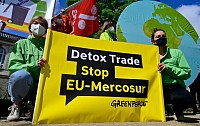SHOP IRISH
The Mercosur Deal: A Threat to Irish Farmers and Food Security
As the Mercosur trade deal nears ratification, it has sparked significant concern among Irish farmers and food security advocates. The agreement between the EU and Mercosur countries—Brazil, Argentina, Paraguay, and Uruguay—is poised to open European markets to a flood of agricultural imports. While proponents tout the deal as an economic win, its potential consequences for Irish agriculture and food sovereignty cannot be overlooked. Here, we explore the risks and challenges the deal poses to Ireland.
A Blow to Irish Farmers
1. **Unfair Competition from Low-Cost Imports**
The Mercosur deal would allow large quantities of beef, poultry, and other agricultural products from South America to enter the EU market at reduced tariffs. Irish farmers, particularly those in the beef sector, would face an uphill battle competing against these low-cost imports. Production costs in Mercosur countries are significantly lower due to differences in wages, land prices, and regulatory standards, creating an uneven playing field.
2. **Undermining EU Standards**
Mercosur countries often operate under less stringent environmental, animal welfare, and food safety regulations compared to the EU. Irish farmers, who uphold some of the highest standards in the world, may find their efforts devalued as cheaper, less-regulated imports flood the market.
3. **Depressed Market Prices**
A surge of cheaper South American imports is likely to drive down prices for Irish agricultural products, reducing profitability and threatening the viability of family-run farms. This would exacerbate the financial strain already faced by many small and medium-sized farming operations across Ireland.
4. **Impact on Rural Communities**
Farming is the lifeblood of many rural Irish communities, providing employment and sustaining local economies. If farmers can no longer compete, the economic and social fabric of these areas could unravel, leading to depopulation and diminished rural vitality.
Environmental Consequences
The Mercosur deal has significant environmental implications. Increased agricultural production in South America, driven by export demand, risks accelerating deforestation in the Amazon rainforest. This not only contributes to global climate change but also undermines Ireland’s and the EU’s commitments to sustainable practices. Supporting a trade deal that incentivizes environmental degradation directly contradicts Ireland’s climate goals and the principles of sustainable development.
Food Security at Risk
1. **Over-reliance on Imports**
By opening the floodgates to Mercosur imports, the deal risks weakening Ireland’s domestic food production capacity. This shift could make Ireland increasingly dependent on external suppliers, leaving the nation vulnerable to supply chain disruptions, geopolitical instability, and climate-related shocks.
2. **Compromised Food Quality**
South American agricultural products may not meet the same high standards of safety and quality upheld by Irish and EU farmers. Consumers could be exposed to food products produced under less rigorous conditions, raising concerns about health and safety.
3. **Erosion of Agricultural Diversity**
If Irish farmers are pushed out of key sectors, such as beef production, the country risks losing agricultural diversity. This diversity is crucial for a resilient food system capable of adapting to crises and ensuring long-term sustainability.
4. **Environmental Costs of Imports**
The environmental footprint of transporting large quantities of food from South America to Europe is substantial. This reliance on long-distance imports undermines efforts to create a sustainable, localized food system in Ireland.
Conclusion: A Critical Moment for Irish Agriculture
The Mercosur trade deal presents a clear and present danger to Ireland’s farming sector and food security. While international trade agreements can bring economic benefits, they should not come at the cost of undermining local industries, eroding environmental standards, and jeopardizing food sovereignty.
Irish farmers have long been the backbone of rural communities and a key driver of Ireland’s food economy. Protecting their interests is not just about safeguarding livelihoods; it’s about preserving Ireland’s commitment to high-quality, sustainable, and locally produced food. As discussions around the Mercosur deal progress, it is imperative for policymakers to prioritize the long-term well-being of Irish agriculture and resist the lure of short-term economic gains. The future of Ireland’s farms and food security depends on it.
At SINNE NÁ DAOINE we want to make it easier for the community to source an alternative source for Irish organic food.
Please click on THIS link.


